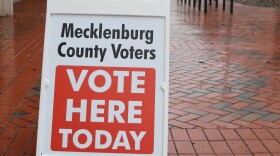With several bills moving through the GOP-controlled state legislature and a round of redistricting coming later this year, Republican legislators may carve a clear path to solidifying their hold on political power in North Carolina for years to come.
In the next week or so, Republican legislators will very likely use their supermajority in the N.C. House and Senate to override Democratic Gov. Roy Cooper's recent veto of a GOP elections bill.
And when they do, the new law will eliminate a three-day grace period for counting mail-in ballots postmarked by Election Day. That could have a marginal effect on election outcomes, but one that nonetheless makes a difference, according to Michael Bitzer, a politics and history professor at Catawba College in Salisbury.
"In this highly competitive battleground state, those percentages matter," Bitzer told WUNC.
For example, Bitzer pointed out that in 2020, around 13,500 mail-in ballots were returned and accepted post-Election Day. And prior to 2016, registered Republicans outnumbered registered Democrats and unaffiliated voters when it came to mail-in ballots.
"What happened in 2016, 2018, and certainly in 2020," he said, "was a shift to Democrats utilizing absentee-by-mail voting method and Republicans basically going to in-person voting."
But Bitzer predicted voters will adapt. "It's going to be incumbent upon both political parties to make their voters aware 'Hey, if you're voting by mail, you gotta get your ballot in before the close of election,'" he added.
GOP plan includes reshaping the state elections board

The three-day grace period has been in place since 2009, when it received unanimous bipartisan approval from state lawmakers. But the issue got caught up in partisan rancor over a 2020 legal settlement between the state elections board and voting rights advocates who sued to ease ballot access during the COVID-19 pandemic.
The settlement led to a temporary six-day extension of the grace period in what GOP lawmakers have called a "collusive" agreement between the Cooper Administration and national Democrats behind the lawsuits.
"Our state board should not be making partisan decisions," said Republican Rep. Destin Hall, chairman of the House Rules Committee, at a meeting this past week. He was advocating for another GOP bill that would restructure the state elections board.
Currently, the board is made up of five members appointed by the governor from lists supplied by chairs of the state's two biggest political parties. And the sitting governor gets to select three from his or her party.
The new board would be made up of eight members, and the majority and minority leaders in the House and Senate would select two each. If the even-numbered board deadlocks on choosing an executive director or a chairperson, the legislature would get final say.
Hall said the new structure will lead to greater bipartisanship.
"It's my opinion that this will actually result in more confidence in our elections," Hall said before the party-line vote that advanced the bill.
Under the proposed legislation, lawmakers would also appoint four members to bipartisan county elections boards.
Democrats like House Minority Leader Robert Reives see the bill as a power grab by GOP lawmakers.
"I frankly think that of all the bodies in government in the last 15 years that have contributed to the toxic air of partisanship that has come, I think this body is number one on the list," Reives said before the rules committee's vote.
Republicans will redraw political maps this fall

Under state law, when county elections boards cannot unanimously adopt an early voting plan, they can turn to the State Board. But if no plan is adopted by a majority of the state board either, the default would be just one early voting site: the local elections office.
That scenario concerns voting rights advocates such as Ann Webb, policy director for Common Cause North Carolina. Take Mecklenburg County, for example. Mecklenburg had more than 365,000 people cast early, in-person votes at 34 sites in 2020.
Reducing that to just one site in a large county like Mecklenburg or Wake would cause chaos, Webb said.
"And frankly, the ultimate result would be disenfranchisement," she added.
Webb also warned that voters in rural counties with small populations are at risk too, if they have to drive long distances to reach the one early voting site available.
On top of their bills, Republican lawmakers plan to redraw political district maps this fall.
A Democratic majority State Supreme Court threw out GOP-drawn maps last year for being unconstitutionally gerrymandered with excessive partisan bias.
In 2022, Republicans picked up two seats on the court and now hold a 5-2 majority, one that is more ideologically aligned with Republican lawmakers.







